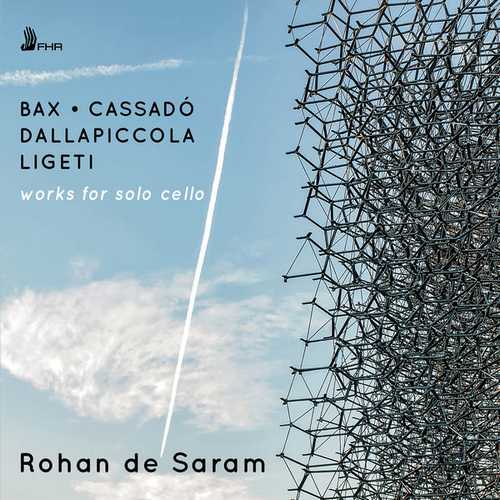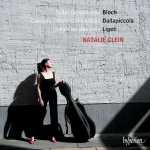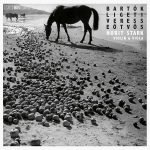
Performer: Rohan de Saram
Audio CD
Number of Discs: 1
Format: FLAC (tracks)
Label: First Hand
Release: 2019
Size: 1.01 GB
Recovery: +3%
Scan: yes
01. Bax: Rhapsodic Ballad
Ligeti: Sonata for Cello solo
02. I. Dialogo
03. II. Capriccio
Dallapiccola: Ciaccona, Intermezzo e Adagio
04. I. Con larghezza
05. II. Intermezzo. Allegro, con espressione drastica
06. III. Adagio
Cassadó: Suite for Solo Cello
07. I. Prelude – Fantasia
08. II. Sardana – Danza
09. III. Intermezzo e danza finale
Virtuoso cellist Rohan de Saram’s new album features four works which have come to the forefront of repertoire for solo cello from the modern era: Arnold Bax’s Rhapsodic Ballad is his only solo piece for this instrument. Likely the most often performed of his earlier works, Ligeti’s Sonata for Solo Cello has for over a decade been used as a test piece for the Rostropovich Competition in Paris. Dallapiccola’s composition was written for the Spanish cellist Gaspar Cassado. It is a substantial, powerful work, and an early serial composition of the composer, full of colourful effects and humour.
Rohan de Saram gave the UK premiere of Arnold Bax’s Rhapsodic Ballade in 1967 and the first public performance of Gyorgy Ligeti’s Sonata for Solo Cello in 1979. From the age of twelve, Gaspar Cassado was de Saram’s main cello teacher. De Saram met Luigi Dallapiccola several times when he came to Cassado’s home in Florence specifically to work on Ciaccona, Intermezzo and Adagio.
Rohan de Saram received the Suggia Award at the age of 16 which enabled him to study with Pablo Casals in Puerto Rico and with John Barbirolli in London. Casals said of him: ‘There are few of his generation that have such gifts.’
As a soloist he has played throughout Europe, Asia, Australia, New Zealand, the USA, Canada and the former Soviet Union with the major orchestras and leading conductors of the world such as John Barbirolli, Adrian Boult, Colin Davis, Zubin Mehta, Seiji Ozawa and Malcolm Sargent. His debut appearance in the USA was with the New York Philharmonic Orchestra at Carnegie Hall at the invitation of Dmitri Mitropoulos. Among the composers he worked with at that time were Kodaly, Shostakovich, Poulenc and Walton. After a recital in America, Piatagorsky presented him with a special bow which he uses for concerts.
De Saram is an outstanding interpreter of contemporary music and has worked personally with many leading contemporary composers. One of the first was Iannis Xenakis whose Kottosfor solo cello was given its UK premiere by de Saram. Later Xenakis wrote two works for him, Epicycles for cello and ensemble and Roscobek for cello and double bass. He had also worked with Gyorgy Ligeti, giving the premiere of his solo Cello Sonata; with Henri Pousseur, giving the world premiere of Racine 19, a work based on a 19-note scale and dedicated to him; and with Luciano Berio, giving the UK premiere of his work for cello and orchestra, Il ritorno degli Snovidenia. After the performance, Berio wrote to de Saram: ‘Your performance of Ritorno is splendid, but besides Ritorno, your sound, your perfect intonation, your phrasing and bowing technique make you a great performer of any music.’ As a result, Berio wrote Sequenza XIV for de Saram: this wonderful piece incorporates in a unique way the rhythms of the Kandyan drum of Sri Lanka, an instrument which de Saram has himself played since his childhood in Sri Lanka.
For many years de Saram was the cellist of the Arditti Quartet for whom a great number of new works were written, resulting in world premieres and many recordings. The Quartet was awarded the Siemens Prize for its services to music and a GRAMMY Award for its recording of works by Elliott Carter, including his Sonata for Cello and Piano and Figment for solo cello.



